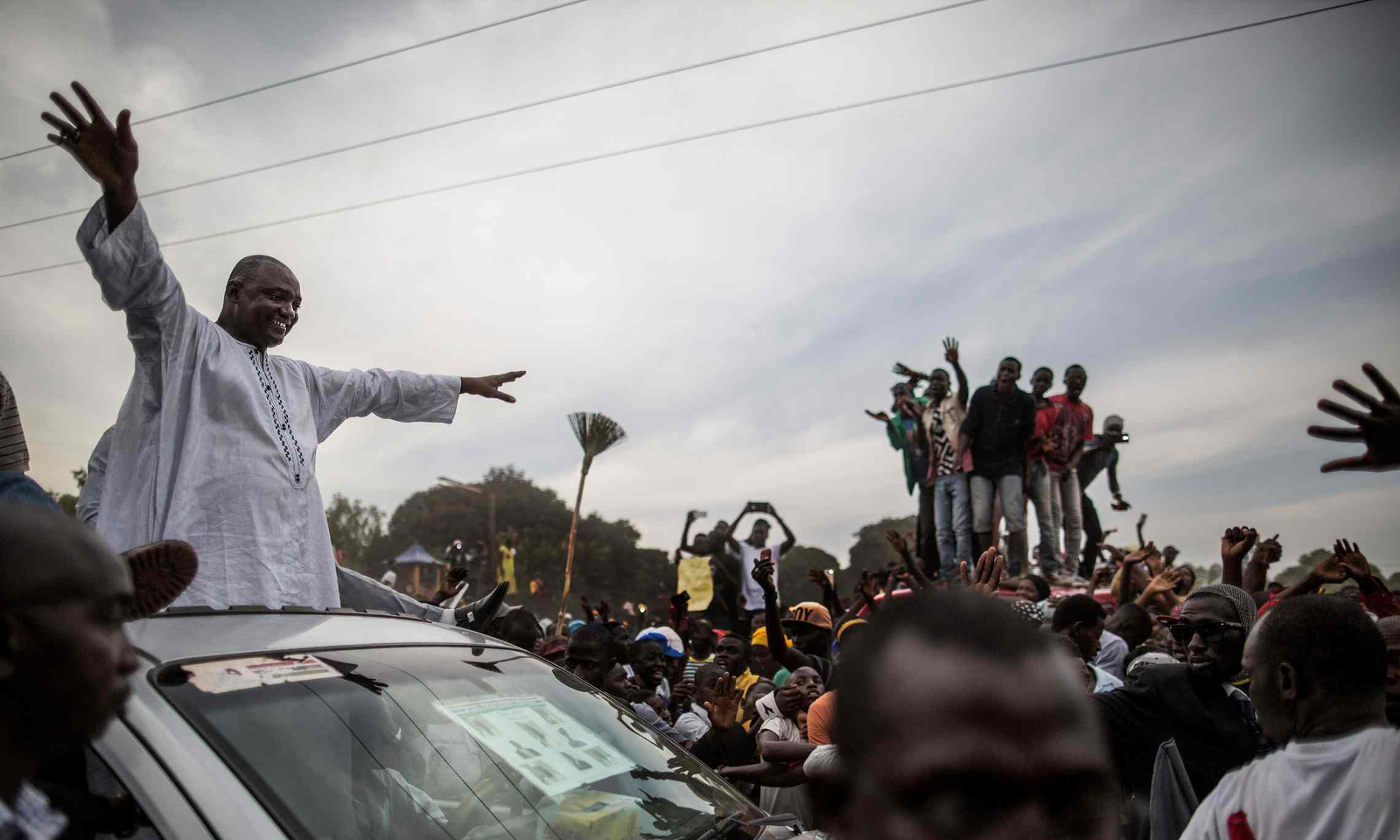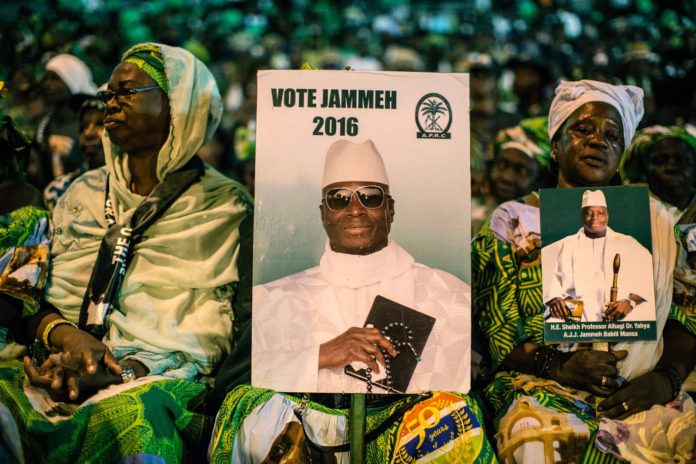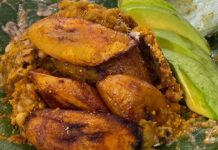KEMBUJE — For the first time in the history of the world, Gambians have voted out a brutal Dictator Yaya Jammeh without resorting to mass uprising, armed rebellion or military coup but through truly peaceful elections. The Dictator who goes by the name, Sheikh Prof. Alhagie, Dr. Yahya AJJ Jammeh Babili Mansa (Bridge Builder) has ruled the Gambia since 1994 when he first came through a coup with an iron fist characterized by arbitrary arrests, illegal detentions, rapes, tortures, enforced disappearances and summary executions. His bloody misrule which saw hundreds of Gambians tortured, disappeared and summarily executed was highly criticized by the international and human rights organizations including the United Nations, Article 19, Human Rights Watch and Amnesty International as well as the US and UK governments and the EU Parliament and ECOWAS and the AU. In fact in the 2011 elections, ECOWAS said they would not send observers because the ground was not level amidst repressive attacks on opponents.
The human rights situation in the country has concerned the world so much so that in November 2014 the UN sent in two Special Rapporteurs on extrajudicial, summary or arbitrary executions as well as on torture to find out about the state of affairs. The Special Rapporteur on summary executions said his findings indicated, “The imposition of the death penalty, the resumption of executions, the use of force by law enforcement agencies, impunity for extrajudicial executions, the use of force during demonstrations, lack of accountability for human rights violations, groups at risk and fear of reprisals. It proposes recommendations to the Government, the international community and civil society to prevent unlawful killings and ensure better protection of the right to life.”
The election was not an easy decision for Gambians either. Prior to the event, there was heated debate among citizens whether in fact it made any sense to contest Jammeh. Since 2012, the opposition had complained of unfair malpractices by the regime that led to the opposition boycotting the 2012 parliamentary elections. They sought engagement with the electoral commission to consider their concerns to no avail. Essentially the incumbent controlled public media and uses state resources for his party activities while interfering with the electoral commission.
Furthermore because of his repressive rule, he has forced the independent media not to give enough coverage to the opposition while several opposition members are continuously arrested, detained, tortured, kidnapped and summarily executed. Hence under the circumstances, many felt the only way to effect change in the country was through a mass uprising or armed rebellion. And indeed these were briefly attempted without success as they were met with severe brutal crackdown. The country experienced external armed attacks in 1996, 1997 and 2014.
And then, we got to 2016. December 1. Prior to the election, the opposition first created a coalition of all the parties. An achievement that has eluded them since 2001 when it was clear that no single party can defeat the incumbent. This is mainly because he changed the electoral laws to make sure victory is based on a simple majority and with only one round of voting. He further changed the laws by increasing the fee for party and candidate registration to over 500 percent last year. Thus with the unfair advantages in his favour, it was clear that in a playing field of multiple actors, he was most likely to win.
But with strong support from the large Gambian diaspora mainly in Europe and the US, the opposition selected a single candidate Adama Barrow from the majority UDP party. Most of the leadership of this party and their leader Ousainou Darboe are currently in jail sentenced to three years for attempting to march to a police station to demand the release of their members arrested in April 2016. The arrested members were led by their youth leader Solo Sandeng who led a peaceful protest on April 14 in the middle of the largest city, Serre Kunda seeking electoral efforts. They were severely tortured and Solo was consequently killed on that same day and buried in unknown location.
Thus the Gambian diaspora provided the resources necessary for the campaign of the coalition, which was pit against the incumbent dictator Jammeh and a third party candidate, Mama Kandeh of GDC. Kandeh was a ruling party MP for 10 years before being sacked from the party of the dictator few years ago. Many were disappointed that he refused to joint he coalition and concluded that he must have been a front for the dictator just to prevent the opposition from wining. At the end of the election, coalition candidate Barrow emerged winner with 44 percent, while the incumbent secured 40 percent and Kandeh 15 percent.
But the election did not go without controversy. Days before the election busloads of people from the Senegalese region of Casamance and Mauritania claiming to be Gambian voters were transported in and lodged at various locations around Banjul. Then on Election Day, the government shut down completely both Internet and telephone services throughout the country. In the evening when results started trickling in which were being announced by the chairman of the electoral commission Alieu Momarr Njai, half way through there was a break. This continued until the following early morning, December 2. By then all indications were that Barrow was in the lead.
When the suspense was indeed getting to boiling point and soldiers seen deployed around the towns and villages, it came as a huge surprise that in fact the dictator, having lost the election was prepared to concede defeat and congratulate the new president-elect. And this is what happened. Reports coming out later indicated that in fact the dictator had no interest to step down but to steal the election only that more powerful forces outside had to prevail on him. It is said that the Americans as well as both Nigerian Pres. Buhari and former president Obasanjo as well as Kofi Annan all played a key role to urge the man to step down.
Since then, things have never been the same again in that country. One Gambian youth wrote on Facebook that it appeared even the air flowing around is different. There are huge celebrations all over the country in a new wave of freedom. The huge billboards and pictures of the dictator and his party are being pulled down while people have been on the streets dancing and singing all day and night. Social media is bursting with all sorts of critical comments from people inside the country never seen before. Indeed there is a new Gambia.
Many observers noted that the vote against Jammeh was not wholly and solely because of public support for the opposition, but a rejection of the dictator for his divisive statements and attitudes which sought to threaten the peace and harmony in the country. In December 2015 he declared the Gambia an Islamic republic and in June 2016, he called out on the largest ethic group, the Mandinka as traitors, ungodly and self-hating people who are foreigners and opposed to his government. He vowed to kill them if he wishes prompting a statement of caution from the UN anti-genocide Advisor Adama Dieng. He also vowed to order soldiers to shoot down on anyone who protest against his regime.
All of these come against the background of untold harm being inflicted upon the people such that his list of victims continues to be compiled inconclusively. Many now believe the major task the country faces is how to transition from dictatorship to democracy in a society that is largely conservative with socio-cultural and Islamic beliefs, which are fertile ground for the germination of tyranny. The challenge is how to sensitize the masses to begin to look at leadership, governance, policy and development issues from a more modern, scientific and objective perspective devoid of fatalism based on culture and religion.

All eyes are now fixed on president-elect Barrow who has not yet made any public statement since his election 72 hours ago. The spokesperson of the coalition, Halifa Sallah of the PDOIS party did give an interview to the national television saying they are making consultations and preparations to face the nation. It appears not many Gambians are concerned about that, and now expect to celebrate their new found freedom.











It’s official. Well, it’s been official for some time but Madi Jobarteh’s essay provides a refreshing perspective on the seismic shift in the past presidential elections in the Gambia. Jammeh accepted defeat and President-elect Adama Barrow is on track to become the president. The striking feature current in the nation’s atmosphere is one of peace and hope. All expect a smooth transition.
As always Madi sheds a stimulating light on the inner workings of the elections, before and after, and what this cool acceptance of defeat by Jammeh portends for Adama Barrow and the political future of the Gambia.
Enjoy!
I hope a type of mass movement can emerge immediately for the people to rally around and channel their new found enthusiam and determinatioin for a meaningful change.
All kudos to Madi Jobarteh and his activism. I don’t agree with everything this brother writes but I support him. He wanted change and now he’s got it. But he mustn’t rest though. Madi needs to critique Barrow with the same enthusiasm with which he criticized Jammeh. Madi has shown that change is in our hands and we as individuals, as writers, can effect the kind of change we want to see. Well, Madi Jobarteh, write more and inform us more about the performance of Barrow lest, before you look up, there’d be another dictator.
Thanks Dade Afre Akufu. Am humbled and inspired even more. Rest assured that it is my life mission to fight for freedom until the end of time. I am very aware of the fact that we could lose our freedom again if we fail to stand up. I will not sit down. Forward ever. Backward never.
Dade A Akufu, dont you think it is still early days, change will not come over night so i think it is to early to make any critque against Barrow. Give the man a chance he has a very big job ahead of him,
This can only be good news for Gambia so Barrow needs the support from those educated to a level where they understand what is going on
Forward is the way to go. Best wishes to all Gambians.